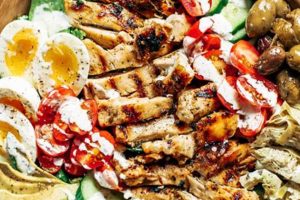
Dressings intended for salads consumed as part of a raw food diet are typically made from uncooked and unprocessed ingredients, such as fruits, vegetables, nuts, seeds, herbs, and cold-pressed oils. Examples include... Read more »

Low-calorie, hydrating meals featuring cucumbers as the primary ingredient often incorporate a variety of fresh herbs, vegetables, and light dressings. A typical example might include sliced cucumbers, red onion, dill, and a... Read more »

Emulsified mixtures of healthy fats like extra virgin olive oil, often combined with acidic components such as lemon juice or red wine vinegar, characterize dressings aligned with Mediterranean dietary principles. These dressings... Read more »

A dish featuring chicken as the primary ingredient, prepared without plant-based components like fruits, vegetables, or grains, aligns with the principles of a carnivorous diet. Typically, such a dish might incorporate animal-derived... Read more »

Emulating the dietary habits of Paleolithic humans, dressings for salads aligned with this approach prioritize natural, unprocessed ingredients. These typically exclude grains, legumes, dairy, and refined sugars, instead favoring components such as... Read more »

Salads aligning with Mediterranean dietary principles typically emphasize fresh, whole ingredients. These often include leafy greens, tomatoes, cucumbers, onions, olives, feta cheese, and a simple dressing of olive oil and lemon juice.... Read more »

Salads aligned with the Paleolithic dietary principles emphasize fresh, unprocessed ingredients like leafy greens, vegetables, lean proteins, fruits, nuts, and seeds. A typical example might include mixed greens, grilled chicken or fish,... Read more »

Low-carbohydrate, high-fat salad dressings are essential for maintaining the nutritional balance required by the ketogenic diet. These dressings typically avoid sugary or starchy ingredients, relying instead on healthy fats like olive oil,... Read more »

Uncooked, plant-based meals featuring a mix of fresh vegetables, fruits, nuts, seeds, and occasionally sprouted grains or legumes form the foundation of this dietary approach. A simple example combines chopped romaine lettuce,... Read more »

Dressings for salads compatible with the Paleolithic diet typically exclude grains, legumes, dairy, and refined sugars. They emphasize natural fats, fresh herbs, and flavorful spices. Examples include dressings based on olive oil,... Read more »


